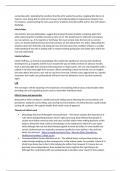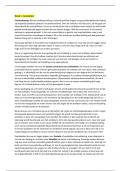Other
BTEC HEALTH AND SOCIAL CARE UNIT 5: MEETING INDIVIDUAL CARE AND SUPPORT NEEDS: LEARNING AIM B (including P3 & M3).
- Institution
- PEARSON (PEARSON)
This is Learning Aim B for unit 5: health and social care meeting individual care and support needs. This section includes P3 and M3. I received a Distinction * for this piece of work.
[Show more]




